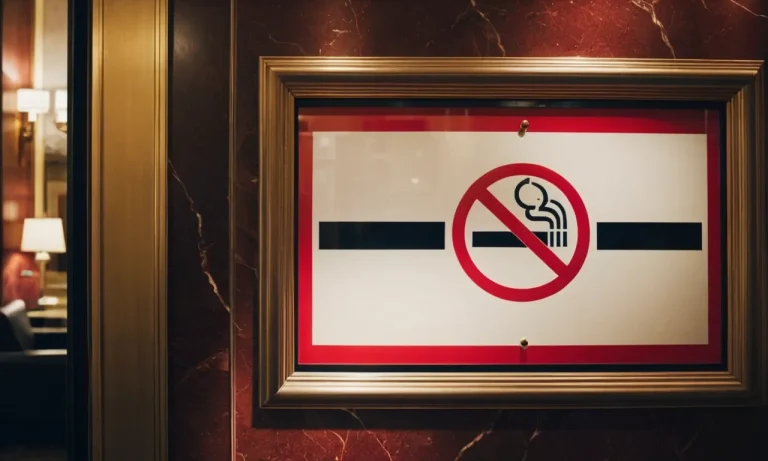When Does A Hotel Guest Become A Tenant? A Comprehensive Guide
Have you ever wondered when your status as a hotel guest transitions into that of a tenant? It’s a question that often arises, especially for those who find themselves staying in a hotel for an extended period.
The line between being a guest and a tenant can be blurred, and understanding the distinction is crucial for both parties involved.
If you’re short on time, here’s a quick answer to your question: A hotel guest typically becomes a tenant when their stay exceeds a certain period, usually 30 consecutive days or more, and they establish a degree of permanence in the accommodation.
In this comprehensive article, we’ll delve into the nuances of this topic, exploring the legal implications, rights, and responsibilities that come with being a hotel guest versus a tenant. We’ll also discuss the factors that determine this transition, as well as the potential consequences for both the guest and the hotel establishment.
Legal Definitions: Guest vs. Tenant
When you check into a hotel, you’re usually considered a “guest” for a temporary stay. But what happens when that stay extends beyond the typical timeframe? At what point does a hotel guest legally become a tenant?
Understanding the legal definitions and distinctions between a guest and a tenant is crucial for both hotel operators and guests.
Hotel Guest Definition
A hotel guest is an individual who rents a room or suite for a short-term stay, typically less than 30 days. This transient arrangement is governed by hospitality laws and hotel policies. Hotel guests are granted access to the premises and amenities during their stay but do not have exclusive possession or control over the room.
According to the American Hotel & Lodging Association, hotel guests are considered “licensees” with limited rights and obligations.
Tenant Definition
On the other hand, a tenant is an individual or party who legally occupies a property for an extended period, usually under a lease agreement. Tenants have exclusive possession and control over the rented space, along with certain rights and responsibilities outlined in landlord-tenant laws.
Unlike hotel guests, tenants are considered “residents” with greater legal protections, such as the right to privacy, quiet enjoyment, and due process for eviction.
Landlord-Tenant Laws and Regulations
The transition from a hotel guest to a tenant is governed by state and local landlord-tenant laws. These laws typically define the length of stay and other criteria that determine when a guest becomes a tenant.
For example, in California, a guest who stays for more than 30 consecutive days or pays rent on a monthly basis may be considered a tenant under the state’s Civil Code. 😊
It’s important to note that landlord-tenant laws vary across states and municipalities, and hotels may have their own policies regarding extended stays. According to a report by the American Hotel & Lodging Association, in some states like New York and Florida, a guest can become a tenant after as little as 7 days of continuous stay.
👏
Understanding these legal definitions and regulations is crucial for both hotel operators and guests to avoid misunderstandings and potential legal disputes. Hotel operators should clearly communicate their policies and comply with applicable laws, while guests should be aware of their rights and responsibilities based on their length of stay and local regulations.
By staying informed and proactive, both parties can ensure a smooth and legally compliant experience. 🎉
The 30-Day Rule: When Does the Transition Occur?
When a hotel guest checks in, they typically expect a temporary stay. However, there comes a point when their status shifts from a transient guest to a tenant with legal rights and protections. This transition is commonly known as the “30-day rule,” but it’s not as straightforward as it sounds.
The specific timeframe and regulations can vary based on state and local laws, hotel policies, and special circumstances.
State and Local Laws
The 30-day rule is a general guideline, but the actual laws governing when a hotel guest becomes a tenant can differ from state to state and even city to city. For instance, in California, a guest is considered a tenant after 30 consecutive days of occupancy, while in New York, the threshold is 30 days, but the guest must also have expressed an intent to remain permanently.
Some states, like Florida, have no specific timeframe and instead rely on factors like payment frequency and intent to establish tenancy. It’s crucial for hotels and guests to familiarize themselves with the local statutes to avoid potential legal disputes.
Hotel Policies and Contracts
In addition to state laws, hotels often have their own policies and contracts that outline the terms of a guest’s stay. These policies may define the maximum length of stay allowed before a guest is considered a tenant, which could be shorter or longer than the typical 30-day rule.
Hotels may also include clauses that explicitly state when a guest’s rights as a tenant would kick in, providing added clarity for both parties. It’s essential for guests to carefully review and understand these policies before booking a long-term stay.
Exceptions and Special Circumstances
While the 30-day rule is a common benchmark, there are exceptions and special circumstances that can impact when a guest becomes a tenant. For example, if a hotel is serving as temporary housing for individuals displaced by natural disasters or emergencies, the rules may be relaxed or suspended to accommodate their unique situation.
Additionally, some hotels may offer extended-stay options with modified policies and contracts tailored for longer-term guests. It’s always best to communicate openly with the hotel staff and ensure a clear understanding of the terms and conditions surrounding your stay.
Rights and Responsibilities: The Differences
When it comes to staying at a hotel, the line between being a guest and becoming a tenant can be blurry. Understanding the rights and responsibilities of each is crucial to avoid any legal complications or misunderstandings. Let’s dive into the key distinctions between these two roles.
Guest Rights and Responsibilities
- Hotel guests are entitled to privacy, reasonable security, and basic services like housekeeping and maintenance. However, they must respect the hotel’s policies and refrain from causing disturbances or damage.
- Guests have limited rights to the room they’ve booked and paid for. The hotel retains control over common areas, and guests cannot sublet or assign their room to others without permission.
- According to the American Hotel & Lodging Association (https://www.ahla.com/), guests are responsible for adhering to check-out times and settling any outstanding charges before departure.
Tenant Rights and Responsibilities
- Tenants enjoy stronger legal protections than hotel guests. They have the right to a habitable living space, privacy, and freedom from discrimination, as outlined in the Fair Housing Act (https://www.hud.gov/program_offices/fair_housing_equal_opp).
- Tenants are responsible for paying rent on time, maintaining the property, and adhering to the terms of their lease agreement. They can be held liable for damages or violations.
- According to a study by the National Multifamily Housing Council, approximately 38% of tenant evictions in the U.S. are due to non-payment of rent (https://www.nmhc.org/research-insight/research-reports/).
Eviction Processes and Procedures
The eviction process for hotel guests and tenants differs significantly. Guests can be asked to leave immediately if they violate hotel policies or cause disturbances, without the need for a formal eviction process.
However, evicting tenants is a legal process that requires proper notice and adherence to landlord-tenant laws.
| Aspect | Hotel Guest | Tenant |
|---|---|---|
| Eviction Notice | None required | Required by law, typically 30-60 days |
| Court Proceedings | Not necessary | Necessary for legal eviction |
| Timeframe | Immediate | Weeks or months, depending on state laws |
It’s worth noting that the line between guest and tenant can blur if someone stays at a hotel for an extended period. In some cases, they may be considered a tenant and afforded additional legal protections.
Consulting local laws and seeking legal advice is recommended in such situations to avoid any potential disputes or legal issues.
Practical Considerations and Tips
Long-Term Stay Planning
If you’re planning an extended stay at a hotel, it’s essential to consider the potential implications of becoming a tenant under local laws. Many jurisdictions have specific regulations that define when a hotel guest transitions to a tenant status, often based on the duration of their stay or the establishment of certain rights and responsibilities.
According to Nolo.com, a legal resource website, in some states, guests become tenants after 30 consecutive days of occupancy, while in others, the threshold is 28 days or longer. 🗓️
To avoid potential legal complications, it’s crucial to research and understand the applicable laws in your area before committing to a long-term hotel stay. You may also want to consult with a local attorney or tenant advocacy group for guidance on your specific situation.
By proactively planning and understanding the legal landscape, you can make informed decisions and protect your rights as a guest or potential tenant. 👍
Communication with Hotel Management
Open and transparent communication with hotel management is key when considering a long-term stay. Before booking, discuss your intended length of stay and inquire about the hotel’s policies and procedures for extended stays.
Some hotels may offer discounted rates or special packages for guests staying beyond a certain number of days, while others may have restrictions or additional requirements. 💬
It’s also essential to clarify expectations regarding amenities, services, and potential changes in your status as a guest or tenant. For example, you may want to address concerns such as housekeeping schedules, meal plans, and access to common areas.
By maintaining an open dialogue, you can ensure a seamless transition and avoid any misunderstandings or conflicts down the line. According to a study by the American Hotel & Lodging Association, effective communication between hotels and guests can improve overall satisfaction by up to 20%. 📈
Documenting Your Stay
Keeping detailed records of your stay can be invaluable, especially if there are any disputes or legal issues that arise. Document all communication with hotel staff, including dates, times, and the names of the individuals you spoke with.
Keep copies of any written agreements, contracts, or policies provided by the hotel. 📝
If you suspect that your status may have changed from a guest to a tenant, it’s crucial to document any actions or statements that support this assertion. For instance, if the hotel begins treating you as a tenant by requiring a security deposit or issuing a written lease agreement, make note of these occurrences.
According to TenantResource.com, a tenant advocacy website, maintaining thorough documentation can significantly strengthen your case in the event of a legal dispute. 📋
Conclusion
Understanding when a hotel guest becomes a tenant is crucial for both parties involved. The transition from guest to tenant status often occurs after a 30-day stay, but it can vary depending on state and local laws, as well as hotel policies and contracts.
As a guest, it’s essential to be aware of your rights and responsibilities, which differ from those of a tenant. Likewise, hotels must adhere to landlord-tenant laws and regulations, ensuring a fair and transparent process for all parties involved.
By being informed and proactive, both guests and hotels can navigate this transition smoothly, avoiding potential legal issues and ensuring a positive experience for all. Whether you’re planning a long-term stay or simply curious about the legal implications, this comprehensive guide has provided valuable insights into the nuances of when a hotel guest becomes a tenant.







